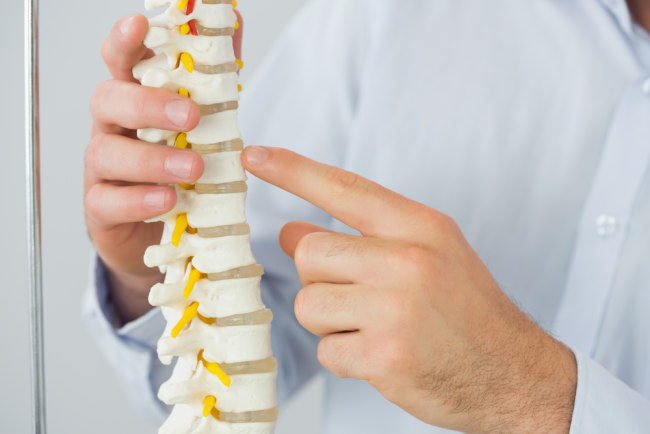Mastoiditis is an infection of the mastoid bone, which is the bone behind the ear. Mastoiditis is more common in children, but can also affect adults.
Mastoid bone is a bone consisting of air cavities and soft texture. The function of this air cavity, among others, is to protect the structures in the ear and regulate air pressure in the ear.

Mastoiditis can cause bothersome symptoms, especially for children. This condition needs to be treated immediately to relieve symptoms while preventing serious complications, such as spreading the infection to other parts of the body.
Causes of Mastoiditis
Mastoiditis is generally caused by an untreated middle ear infection (otitis media). The reason is, when left untreated, bacteria that infect the middle ear can spread to the inner ear, then to the mastoid bone, and cause damage.
Mastoiditis Risk Factors
As explained earlier, mastoiditis is more common in children, but adults can also experience it. The following are some factors that can increase your risk of developing mastoiditis:
- 6 months to 2 years old
- Frequent exposure to cigarette smoke or dirty air
- Have a habit of drinking milk from a bottle while lying down
- Often in daycare, so vulnerable to contracting infections
- Suffering from a cleft lip, because this condition makes a person more susceptible to middle ear infections
Symptoms of Mastoiditis
Symptoms of mastoiditis are generally the same as the symptoms of other ear infections. These symptoms usually appear after a severe ear infection or one that has recurred several times. Some of the symptoms of mastoiditis are:
- Fluid coming out of the ear
- Ear pain
- Redness in the ear or behind the ear
- Swelling behind the ear that feels like it's filled with water
- Ear pushed forward due to swelling behind the ear
- Headache
- Fever
- Hearing loss in the infected ear
When to go to the doctor
Mastoiditis should be treated or even prevented as early as possible. Immediately consult an ear, nose, and throat specialist (ENT doctor) if:
- Symptoms like the above occur to you or your child
- Symptoms occur in infants under 6 months of age
- Blood or pus coming out of the ear
- Pain in the ear is unbearable
- The ear infection that you or your child is experiencing does not get better, even though it has been treated with medication from the doctor
You should also see a doctor if it is confirmed that you have mastoiditis and it does not improve even after treatment. This is very important to prevent complications.
Diagnosis of Mastoiditis
The doctor will start the examination by asking the patient's symptoms. After that, the doctor will examine the inside of the patient's ear using an otoscope, which is a tool in the form of a funnel with a magnifying glass equipped with a light.
To confirm the diagnosis, the doctor may perform additional tests in the form of:
- Blood test to count white blood cell levels
- Head scan with X-ray, CT scan, or MRI
- Culture of fluid coming out of the patient's ear to detect the presence of bacteria
At the doctor's discretion, a lumbar puncture or spinal fluid sampling may be required if the results of the above examination indicate mastoiditis. This examination aims to determine whether this infection has spread to the central nervous system.
Mastoiditis Treatment
Mastoiditis is a serious infection and can cause life-threatening complications. Therefore, this condition must be treated immediately with antibiotics.
Patients with mastoiditis may require hospitalization so that antibiotics can be given by injection or intravenously so that they are more effective. Patients will usually also be given oral antibiotics after returning from the hospital.
If the mastoiditis has not improved despite antibiotics, the doctor may perform surgery, such as:
- Myringotomy, which is surgery to remove pus from the middle ear
- Mastoidectomy, which is surgery to remove the infected part of the mastoid bone
Mastoiditis Complications
Mastoiditis can cause serious complications, especially if the mastoid bone has been damaged due to delay in treatment or due to ineffective treatment. Some of these complications are:
- Vertigo
- Paralysis of the facial nerve
- Hearing loss or deafness
- Inflammation of the lining of the brain or meningitis
- Abscess in the brain or spinal cord
- Sepsis
Mastoiditis Prevention
Given that mastoiditis occurs as a result of untreated otitis media, the best way to reduce the risk of developing mastoiditis is to prevent otitis media or other ear infections.
The following are some steps parents can take to prevent mastoiditis in children:
- Immunize your child according to the recommended schedule.
- As much as possible do not let the child drink milk from a bottle while lying down.
- Protect children from exposure to cigarette smoke and air pollution.
- Give exclusive breastfeeding to the baby.
- Don't take your children to crowded places where there is a risk of transmitting infection, such as malls and daycare centers.
In addition, immediately consult a doctor if your child has signs of an ear infection, such as ear pain or discharge from the ear. Early examination and treatment of ear infections can prevent mastoiditis.
For adults, mastoiditis prevention measures can be done by quitting smoking and controlling allergies if any. Adults who have often experienced otitis media are also advised to consult a doctor regarding treatment to prevent recurrence of otitis media.









